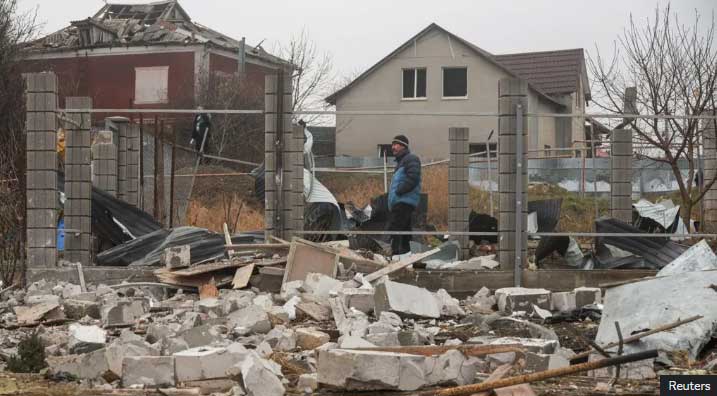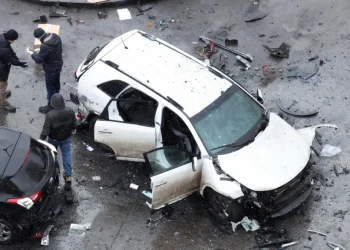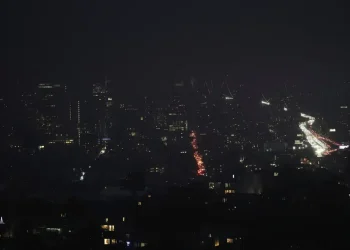Putin Threatens Kyiv Decision-Makers After Strike on Energy Grid
Russian President Vladimir Putin has issued a threat to target decision-making centers in Ukraine’s capital, Kyiv, using Russia’s new ballistic missile, the Oreshnik. This statement came just hours after Russia launched a large-scale strike on Ukraine’s energy grid overnight, which Putin described as retaliation for Ukraine’s attacks on Russian soil using U.S.-supplied Atacms missiles.
In response, Ukrainian President Volodymyr Zelensky warned that any Russian attempts at “blackmail” would face a strong reply from Ukraine.
Ukraine recently used Atacms and UK-supplied Storm Shadow missiles to strike inside Russia, marking the first such attacks since the invasion began in February 2022, with approval from the United States, the UK, and France.
The Russian strike was carried out over several hours, involving waves of drones and missiles hitting various locations across Ukraine. This marked the second time this month that Ukraine’s energy infrastructure has been targeted. While no casualties were reported, the attack left more than one million Ukrainians without power.
Zelensky condemned the use of cluster munitions in the attack, noting their severe risk to civilians and the challenges they present to rescue teams and repair workers. “Cluster warheads are a particularly dangerous type of weapon,” he said, adding that they significantly complicate efforts to restore vital services.
Putin confirmed that the attack involved 90 missiles and 100 drones, including the new Oreshnik ballistic missile, which he claims is “intercept-proof.” However, U.S. officials believe Russia has only a limited number of these experimental missiles and will need time to produce more.
In his nightly address, Zelensky responded to Putin’s threats, accusing the Russian president of having no interest in ending the war and attempting to force U.S. President Joe Biden to accept Russia’s terms. Zelensky also highlighted Putin’s warning that Russia would not allow Ukraine to acquire nuclear weapons, threatening to use “all means of destruction” if Ukraine ever pursued them.
This threat likely refers to recent reports suggesting that some unnamed Western officials had considered providing Ukraine with nuclear weapons, particularly before President Biden leaves office in January. Zelensky has frequently expressed frustration over the 1994 Budapest Memorandum, which saw Ukraine give up its inherited nuclear weapons from the Soviet Union in exchange for security assurances that have not been upheld.

The Russian attacks caused explosions across several Ukrainian cities, including Odesa, Kharkiv, and Lutsk. Kyiv was also targeted, but Ukrainian authorities claimed to have intercepted all missiles aimed at the capital. The attack lasted nearly 10 hours, with at least 12 regions across Ukraine, including three in the west, affected. Emergency power outages were imposed in response, with over 280,000 people in the Rivne region and 523,000 in Lviv left without electricity. In Kherson, authorities warned of power outages lasting several days.
With winter approaching, Ukrainian officials are concerned that Russia will continue its assault on the energy grid. The country has already faced bitter winters during Russia’s invasion, and the current one promises to be just as harsh. Ukraine’s energy company, DTEK, reported significant damage to its thermal plants, and this attack marks the 11th major assault on Ukraine’s energy infrastructure since March. Over 190 attacks have been made on energy plants since the invasion began.
Despite the destruction, Ukraine has received significant support, including up to €107 million ($89 million) worth of equipment aid from the European Commission and the U.S. to help restore power. But as temperatures drop and snow begins to fall, Ukraine braces for yet another challenging winter of war.
This article was rewritten by JournosNews.com based on verified reporting from trusted sources. The content has been independently reviewed, fact-checked, and edited for accuracy, neutrality, tone, and global readability in accordance with Google News and AdSense standards.
All opinions, quotes, or statements from contributors, experts, or sourced organizations do not necessarily reflect the views of JournosNews.com. JournosNews.com maintains full editorial independence from any external funders, sponsors, or organizations.
Stay informed with JournosNews.com — your trusted source for verified global reporting and in-depth analysis. Follow us on Google News, BlueSky, and X for real-time updates.














